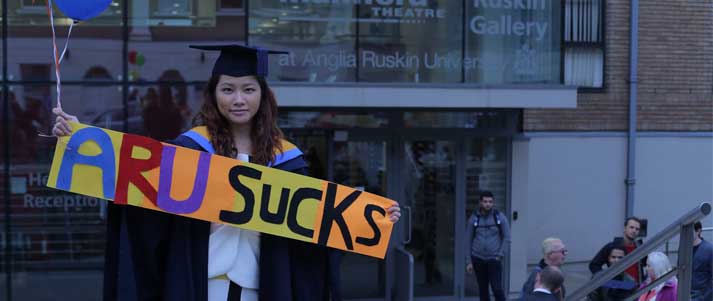How to complain and get compensation from your university
Feel like your university has given you a bad deal? In this guide, you'll find the knowledge, tools and courage to complain about poor service and receive compensation.

Credit: Tupungato, Marcos Mesa Sam Wordley – Shutterstock
The number of students making complaints to their university is on the rise. In 2023, the ombudsman OIA received 3,137 complaints. This was their highest ever number.
That year, the total amount of compensation the OIA recommended was £1,218,875.
So, do you think you've got a legitimate grievance with your uni? Follow our steps to submit a complaint and you could receive hundreds in compensation.
How to make a complaint to your university
-
Try to come to an informal solution
Making an official complaint to your university can be a long and stressful process. If possible, you should look into resolving it informally first.
Try speaking to your personal tutor. They might be able to act on your behalf and resolve the situation for you. This will be much quicker and easier than putting together a formal case and letter.
Your university will probably expect you to try this before submitting an official complaint.
-
Read up on your university's complaints policy
Every university has a different way of dealing with student appeals and complaints. The first thing to do is to read through your own uni's internal policy.
You should be able to find it online pretty easily. Try Googling something like "X university complaints policy".
For example, the University of Manchester outlined its procedure in a flowchart. If you can't find your university's policy online, speak to student services.
Note that there may be a certain time period in which you need to submit your complaint after the incident takes place. So don't hang about!
-
Know what you're complaining about

Credit: Olena Yakobchuk – Shutterstock
It's important to have a clear idea of what your complaint concerns.
This might sound obvious, but taking a bit of time to narrow down your complaint to a few brief points will work wonders. You'll need to be specific but concise and have good evidence to back it up.
Technically, you can make a formal complaint or appeal about anything you think breaches the terms of the contract you signed up for (or your rights as a student), as long as it's something the uni has control over.
But, only go down this road if you're 100% serious and feel that other students could benefit from changes being made. Otherwise, you're just wasting their time and yours.
Some reasons for legitimate complaints are:
- Poor facilities and learning resources
- Student accommodation issues
- Cancellation of university courses
- Cancellation of timetabled tutoring
- Changes to course content, structure or qualification
- Changes to course fees or unexpected extra costs
- Discrimination or harassment
- Cheating or plagiarism allegations
- Marking of degree assessments.
You can't generally submit a complaint related to 'academic judgement', like being unhappy with a grade you've received. Your uni should have a separate appeals procedure for this.
However, you could potentially make a complaint about poor teaching or malpractice which led to you receiving a bad mark.
If you're making a complaint about your course (or any other aspect of your university education) not being what you expected, you'll have to show you did thorough research beforehand. This could include attending open days, asking questions and reading the prospectus thoroughly.
If you didn't realise you'd only have four contact hours a week, but it clearly states that on the website, you don't have much chance with a complaint.
-
Check the CMA's Rights for Students
Since March 2015, the CMA (Consumer and Marketing Authority) has regulated how unis comply with consumer law.
It provides a document, which was recently updated, with some rules and regulations for unis to follow. It's worth checking if your complaint is in breach of any of these. If it is, you've got a good case.
-
Know what you want from your complaint
Think about what you want to get out of this process. Do you simply want somebody to recognise that they've behaved irresponsibly and apologise? Or are you seeking a tuition fee discount or cash settlement?
It's important to consider this, as the process could turn out to be quite time-consuming. Put together some clear demands that you believe would compensate you fairly.
If you're asking for monetary compensation, it must be reasonable, realistic and justifiable.
-
Collect the evidence
You'll need to present a convincing case against the relevant parties (e.g. a tutor, department or even the uni itself) by gathering credible evidence.
This could include any emails or written communication you've had, photos or videos of incidents (if appropriate) or statements from witnesses or relevant professionals (e.g. your doctor).
Also, read through what you signed up for. When you registered as a student, you'll have likely signed a contract that outlined your university's responsibilities. If they're in breach of that, you've got a strong case.
-
Use your resources

You don't have to go through the process alone. There are people whose job it is to help you out.
Start with your student union.
Contact student advisers, councillors and anyone else with experience with the uni's complaints system.
Perhaps your parents might be able to help, or you know some law students who are great at presenting cases. And, of course, you've got the whole internet at your disposal.
If you want to make a complaint about your student union, there should be a separate complaints procedure for this. It will usually be outlined on the union website. -
Submit your formal complaint
Now you've done your homework and have all bases covered, it's time to write up your complaint following the set procedure.
Refrain from getting too personal. Try to stay calm and rational. This will work in your favour in the long run.
Provide specific examples of times that you think you've been treated unfairly. This will allow an assessment to take place.
-
Receive a Completion of Procedures letter
As you might expect, issues can take time to be resolved. But, the university has an obligation to send you a 'Completion of Procedures' (COP) letter as soon as possible. This essentially outlines the issues they've identified and their final decision.
You should hear confirmation that they've received your complaint within a week. However, it may take a month or two for them to come to a decision.
Without a COP letter, it will be difficult to take your case to an ombudsman (a person or entity who's been appointed to look into complaints about companies and organisations) if you're dissatisfied with the outcome. So, if you don't get one, make sure you chase them up.
-
Consider taking your complaint to an ombudsman
Hopefully, you're satisfied with the response you get from your uni.
But if you feel that you haven't achieved the outcome you deserve in your situation, you could approach an ombudsman.
The ombudsman you'd need to contact will depend on where in the UK you're studying:
- If you're studying in England and Wales – The Office of the Independent Adjudicator for Higher Education (OIA)
- If you're studying in Northern Ireland – Northern Ireland Public Services Ombudsman (NIPSO)
- If you're studying in Scotland – Scottish Public Services Ombudsman (SPSO).
These are independent bodies tasked with reviewing student complaints. They don't cover everything, however.
You can't generally go to them with cases about admission, academic judgement, student employment or any complaint which has or is currently going through court.
They don't have the power to punish or fine universities. But, they can recommend that unis take action to redress a problem (including offering compensation). These recommendations are usually followed.
The ombudsman can only look at your complaint once you've gone through the internal complaints procedure of your uni. You'll need the COP letter.
You have 12 months from the date on the letter to file a complaint here. They'll ensure your case is looked at objectively and will consider your uni's decisions and explanations.
Note: In exceptional cases, they may also look at complaints where the uni hasn't gotten back to you within 90 days of your initial complaint.
-
Submit your complaint to the ombudsman
Download and fill in a complaints form. Be clear on why you dispute the uni's decision and what your expectations are.
Send it off with all the relevant evidence and paperwork used for the university complaints procedure. Don't forget to include your COP letter.
The ombudsman will either agree with the uni or force them to review their decision. If the case is serious and you're still not satisfied with the outcome, you could seek proper legal advice. Contact Citizens Advice for information about this.
Many students (and graduates) feel uneasy about challenging their lecturers or their uni. But, it is your right. Voicing valid concerns and holding the uni accountable can help to improve future students' experiences.
It was reported by Sky News in May 2023 that more than 100,000 students were trying to sue their unis over the impact of the pandemic and strikes on their studies.
How one graduate got £61k from a university complaint

Credit: Fiona Pok – Facebook
In June 2019, it was announced that a graduate from Anglia Ruskin University had received a huge payout over a complaint to her uni.
Claiming her course turned out to be a "Mickey Mouse" degree, Pok Wong, also known as Fiona, pursued her complaint for several years. That was, until she was finally offered the out-of-court settlement of £61,000. However, once her legal costs were deducted, the amount she actually received was substantially less than this.
Save the Student asked her what advice she'd give to other students thinking about complaining. She gave us this top tip:
Make a record of detailed events when things don't sound right at the university, including meetings and conversations.
In my case, many lectures were cancelled or lecturers didn't turn up... so record the detail of such events.
And, if you have any doubts about going into your degree, Ms Wong also advised:
Consider taking an insurance policy to cover your legal claim before formally enrolling in the education programme.
To find out more, read about Pok Wong's story and how she received her payout.
Knowing your consumer rights is extremely useful if you decide to complain.








